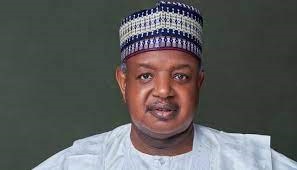Minister laments poor international support for govt reforms
CHIGOZIE AMADI
The Minister of Budget and Economic Planning, Atiku Bagudu, has expressed dissatisfaction with the inadequate support from international development partners, noting that the government had anticipated greater assistance for its reform efforts to yield results.
He said the international bodies have not provided enough support to consolidate the “bold, courageous, and risky” reforms undertaken by the current administration since its inception over a year ago.
He advocated enhanced international development assistance to African countries, suggesting that it should be more proportional to their populations.
Bagudu said this in an interview with journalists on the sidelines of the just concluded African Caucus meeting with the theme, “Facilitating Intra-African Trade: Catalyst for Sustainable Economic Growth in Africa”.
The African Caucus, established in 1963, aims to strengthen the voice of African Governors in the Bretton Woods institutions on development issues pertinent to Africa.
Representing all 54 African countries, the Caucus meets twice yearly to consolidate views and convey them to the heads of the IMF and World Bank through a memorandum.
The PUNCH reports that Nigeria has secured a total of $4.95bn in loans from the World Bank under the administration of President Bola Tinubu.
Not less than six loan projects have been approved and they include loans for power ($750m), women empowerment ($500m), girl’s education ($700m), renewable energy ($750m), economic stabilisation reforms ($1.5bn) and resource mobilisation reforms ($750m) for the benefit of Nigerians.
Speaking during the interview, the former Kebbi governor said international development assistance is important to mobilise capital, adding that priority should be given to the African caucus.
He added that geography should not prevent any nation from accessing capital while allowing another country to receive it in abundance.
He said, “For us in Nigeria, both historically as an evolutionary development, international development assistance is important to de-risk other forms of investments. It was for us a tool that would mobilise capital that would otherwise not be provided by the private capital market at that time.
“Nigeria recognised a long time ago that it intends to benefit from international development. it is also in a position to assist others and that is why Nigeria had 1976, a trust fund with the African Development Bank.
“But the resources that we require have been much less than what we have been able to mobilise both historically and concurrently and even despite the increasing relevance of bilateral official development assistance or that which is provided for a bloc of countries for example like the European Union, Global gateway or the Chinese silk and belt initiative.”
The minister added that the “Assistance should be a tool to mobilise long-term capital at the scale of shared prosperity.”
Bagudu said he “just finished participating in a session on the International Development Association, stressing that “while a country with 10 million people in Europe can find $200bn, Nigeria with over 200 million people can hardly find $10bn.”
Meanwhile, African finance ministers and central bank governors have outlined a four-point strategy to enhance intra-African trade and stimulate economic growth.
The plan agreed upon at the 2024 African Caucus Meeting in Abuja, focuses on strengthening payment systems, improving energy access, leveraging partnerships with banks, and reforming the global financial architecture, a communique issued on Sunday read.
The meeting, held amidst a challenging global economic climate, stressed the need to increase intra-African trade as a catalyst for job creation and investment. While acknowledging Africa’s economic resilience, the leaders emphasised the continent’s low share of global trade, currently at 14.4 per cent.
To address this, the caucus called for concerted efforts to dismantle trade barriers, including tariffs, fragmented payment systems, and inadequate infrastructure. They also highlighted the importance of the African Continental Free Trade Area in promoting trade among African nations.
The communique read, “At the meeting, the governors underlined four key pathways to boosting intra-Africa trade, namely: strengthening pan African payment ecosystem, enhancing energy access, affordability, and connectivity; leveraging partnerships with MDBs, and reforming global financial architecture.
“The Caucus also called on the IMF and World Bank Group to ensure that their support to member countries continues to be guided by principles of balance and evenhandedness, and consistent with their policies. These considerations are all the more important at a time when countries are being assailed by adverse exogenous shocks and facing immense financing needs.”























